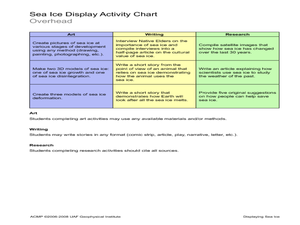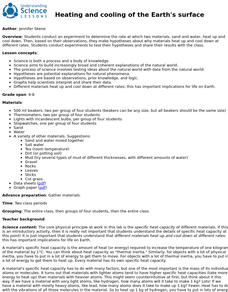Curated OER
Water Cycle and Ecosystems
Learners explore the water cycle. In this investigative lesson, students examine the water cycle process. They will record their observations and discuss marine and freshwater ecosystems.
Curated OER
Life on a Fiery Planet
Students study the effects on the evolution of human culture from volcanic events worldwide.
Curated OER
The Ocean Floor
Fifth graders discuss the process of sedimentation and the continental drift theory. They locate major structures on the ocean floor and they identify life forms at each level of the ocean.
Curated OER
Rock Cycle
Third graders identify various types of landforms of the United States. They discuss earth movements that produce geologic structures and landforms and define cycle as it relates to rocks and soil. They demonstrate the processes forming...
Curated OER
Displaying Sea Ice
Pupils display their knowledge of sea ice. In this earth science lesson, students create displays reflecting their understanding of sea ice.Pupils research the development of sea ice on a variety of bodies of water, and use proper...
Curated OER
Save the Bay!
Students explore environmental protection by creating a presentation in class. In this Chesapeake Bay lesson, students discuss the current threats from human beings towards the delicate balance of life near the bay. Students identify the...
Curated OER
Weather "Toons
Student use a variety of resources including print, CD-Rom and Internet information to study a weather process. They design a weather cartoon citing the bibliographic sources from their research.
Curated OER
Water, Water Everywhere, and Nary a Drop to Drink!
Students sing the continent song and locate oceans between the continents on a map. They read "They Earth is Mostly Ocean" and copy notes into their journals. They watch a demonstration of water and saltwater evaporated to see what is...
Core Knowledge Foundation
A Time for All Seasons - Spring
Celebrate the arrival of spring with this fun primary grade science unit. Engaging young scientists with a variety of hands-on activities and inquiry-based investigations, these lessons are a great way to teach children about seasonal...
Core Knowledge Foundation
A Time for All Seasons - Summer
The sun is shining and the birds are singing, what better time to teach young learners about the fun season of summer. In this week-long science series, children learn how the rotation and orbit of the earth influence the days and...
Core Knowledge Foundation
A Time for All Seasons - Winter
As the days get shorter and a chill enters the air, it's time to start teaching your little ones about the wondrous winter season. Through a series of teacher demonstrations, whole-class read alouds and discussions, and hands-on...
Curated OER
Ecology of the Savanna-Forest Boundaries in Central Brazil
Learners explore photosynthesis. In this photosynthesis lesson, students label parts of photosynthesis and take notes. Learners conduct experiments on leaves, make observations and record their findings.
Cornell University
Fibers, Dyes, and the Environment
Nanofibers can be made through electrospinning or force spinning in order to reduce the negative impact on the environment. Pupils study the role of fibers and dye on the environment through a series of five hands-on activities. Then,...
University of California
Heating and Cooling of the Earth's Surface
Scholars collect data from heating sand and water before forming testable hypotheses about why sand heats up faster. Afterward, they develop and run experiments to test their hypotheses.
Curated OER
Unit 2: Global to Local: Understanding My Place in the Hydrosphere
What does the ground around your home have to do with water pollution? Young ecologists learn about their local watershed and create their own cause-and-effect models of the hydrosphere.
Curated OER
Unit 3: Scientific Writing
Write-on! Demonstrate a writing model and support learners as they write an informational essay on a water resource issue of your (or their) choosing. The lesson plan provides a well-scaffolded summative writing experience that wraps up...
Curated OER
Our Disastrous World
Learners explore natural disasters around the world from the experiences of other students, friends and families. They collaborate with countries such as Japan, China, India, Australia, Russia, Great Britain as well as from the United...
Kenan Fellows
Terrarium in a Bottle: Modeling the Atmosphere, Greenhouse Effect, and Water Cycle
You've heard of farm to table ... but what about farm in classroom? Junior agriculturalists embark upon a two-week journey into the science of growing things. Based upon the classic terrarium in a two-liter experiment, the lesson goes...
Orange County Water Atlas
Location, Location, Location…
Young geographers discover not only how to read and recognize coordinates on a map, but also gain a deeper understanding of latitude and longitude and how climate changes can vary significantly across latitudes.
Rainforest Alliance
Investments in Forest Carbon
One hundred metric tons of CO2 can accumulate in one acre of forest over time—that's a lot of carbon! In the activity, groups of middle school learners determine what makes forests important. They then solidify the concept by using a...
National Wildlife Federation
The Amazing Adventures of Carbon: How Carbon Cycles through the Earth
Here's a stat for your pupils: 18 percent of the human body is carbon! Part 10 in the series of 12 takes pairs on an adventure through the carbon cycle. After a class reading about carbon, pairs read and choose their own adventure...
Curated OER
The Seasonal Cycle
Students complete a unit of lessons on the four seasons. They examine the effect each season has on plants, animals, and people during the actual season, read magazine and newspaper articles, and create a calendar and poster about each...
Curated OER
A Seed Dispersal Investigation
Students investigate the function and purpose of seed dispersal. In this garden lesson, students examine the importance of wind in the plant cycle. Students construct a flying seed model from an attached design and discuss if it can be...
Curated OER
Infrared-Hot
Students describe how the sun heats the Earth, explain the nature of infrared light, explain how thunderstorms are formed and use infrared maps to predict severe weather.

























